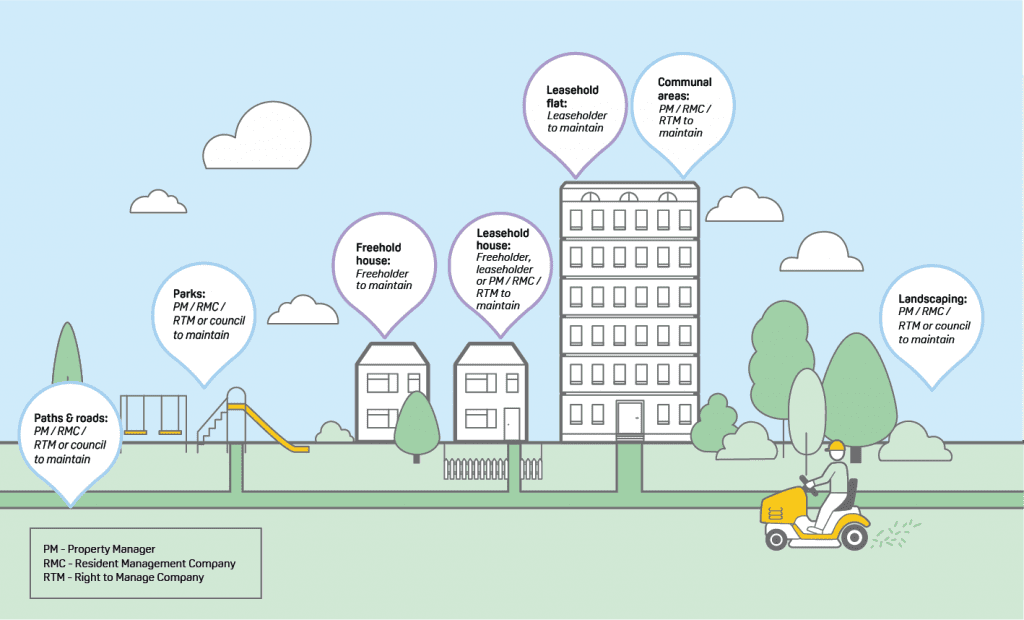21 June 2022
Residential block management can be confusing, as several stakeholders can play a part in the management of a development. In this article, we discover who is responsible for different areas of the development, how they all work together, and how managing agents like FirstPort can help.
Who is responsible for different areas in the development?
Depending on the type of residential development, different parties will be responsible for different spaces. Here is an example of how a typical development is managed:

Who are freeholders and leaseholders?
A freeholder (sometimes referred to as the ‘landlord’ or ‘building owner’) owns the freehold of the building and the land it sits on, normally a person or company. They will either manage the development themselves, or in most cases, hire a professional managing agent (also known as a property manager) to look after the development.
Under the leasehold system in England and Wales, leaseholders are the individual homeowners in a block of flats and some other properties. They own the property on a lease and are responsible for maintenance inside the property. Leaseholders also have an obligation to contribute to the management of their development’s communal areas and shared spaces through a service charge.
What is a service charge and how is it calculated?
A service charge is a fee collected from leaseholders, normally paid in advance once or twice a year, that covers the costs of maintenance works at the development, including lifts, hallways, gardens and landscaped areas.
It’s normally calculated by working out what jobs will need doing throughout the year to ensure the building and grounds are well maintained. These costs will be compiled into a service charge budget, and the service charges will be divided out between the leaseholders.
What is a Resident Management Company?
A Resident Management Company (RMC) is a limited company normally set up by the developer of a new build development to manage the building on behalf of leaseholders and residents. They either do this themselves (self-managing) or appoint a professional managing agent like FirstPort.
Being a director of an RMC is an unpaid role, with members appointed by their fellow leaseholders. To find out more about becoming a Resident Director, read our blog: The Role of a Resident Director.
Whether they self-manage or partner with a professional managing agent, an RMC is ultimately responsible for:
- Making sure the building meets all relevant legislation and health and safety regulations
- Organising repairs and maintenance work
- Deciding how service charge funds are spent to look after the development
- Being the voice of the residents and making decisions that will benefit the entire community
What is a Right to Manage Company?
Another type of homeowner-led property management is Right to Manage (RTM) which gives leaseholders the statutory right to take over the management of their property from the freeholder by setting up a special company – a Right to Manage Company.
The Right to Manage is only available to leaseholders of flats, not houses, and as with RMCs, RTM Companies can either manage the building themselves or appoint a professional managing agent to work on their behalf.
What is a Property Manager?
A professional property manager will fill any skills and experience gaps in the RMC or RTM Company and provide them with a range of support and advice. They are experts in landlord and tenant law, estate finance, as well as important building and health and safety regulations; so, they will help the RMC or RTM Company to understand and meet their legal requirements.
Professional managing agents will regularly carry out site visits to check the development is well maintained, tendering work contracts and organising repairs and maintenance works on behalf of the RMC or RTM Company as required. They also help to look after administration and financial work, such as:
- Keeping financial records up to date
- Managing service charge budgets and accounts
- Collecting service charges from leaseholders
- Managing arrears
- Acting as the Company Secretary and registered office if required
To find out more, watch our video series on how FirstPort supports Resident Management Companies.
Trust FirstPort to be your managing agent
With over 40 years’ experience managing properties on behalf of freeholders, developers, RMC and RTM companies across the UK, we know what it takes to run a successful development.
Whether it’s your first time selecting a managing agent, or you’re looking to switch providers, we can help. Simply complete the form below and somebody from our New Business team will be in touch:
"*" indicates required fields
-
![]()
Resident Managed Developments
-
![]()
The Role of a Resident Director
-
![]()
The Resident Director Survey 2022
-
![]()
03. How we support Resident Management Companies (RMCs)
-
![]()
Top ten traits of effective Resident Directors
-
![]()
Smooth sailing at The Waterways with our RMC partnership
-
![]()
Getting things shipshape with Right To Manage Directors at Centre Quay









